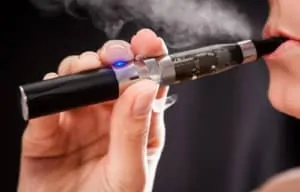Archives

Whole Body Concerns
Vapes, or e-cigarettes, have been in the U.S. since 2007, but their popularity seems to have increased rapidly over the past few years. Because of this dramatic surge in popularity, science and research regarding these devices is a little behind. But recent studies show us that maybe vaping isn’t as safe as we may have thought. Vaping may be linked to an increased risk of pneumonia, rapid heart rate, congestive heart failure, and stroke. So while we may have once believed vaping was a safer alternative to smoking, that simply may not be the case.
Oral Health Concerns
More research on how vaping affects oral health is needed, but more and more studies continue to find that there are certain risks involved, including:
Dry Mouth
Many vape liquids include the ingredient propylene glycol, which is known to cause dry mouth. Dry mouth, if not treated, can greatly increase the risk of decay, cavities, and gum disease. Not to mention, dry mouth can also cause some serious chronic bad breath, which can be a challenge to overcome.
Inflamed Gums
A 2016 research study found a potential link between vaping and gum disease. To be more specific, vape juice caused an inflammatory response in the gum tissue that can put you at risk for gum disease.
Cell Damage
Vaping may also destroy cells’ DNA and inhibit their ability to divide a grow. Basically, vaping can kill cells and cause bad breath, bone loss, tooth loss, and gum disease.
Focus on Quitting
Even though some people may have started vaping to help them quit smoking, there’s conflicting research regarding its effectiveness. For example, one study found that e-cigarettes helped current smokers reduce the number of cigarettes they smoked by about half, while another suggested that smokers who use e-cigs are 59% less likely to quit. Instead of trading one habit for another, try to focus on proven ways to break away from nicotine once and for all. Consider:
- Work on limiting the number of cigarettes you smoke a day, and decrease over time.
- Try quitting without the use of nicotine replacements — fair warning, this can be extremely difficult.
- Find different ways people have quit. You never know what may work for you. The American Lung Association is a great resource for smokers who want to quit.
Finding what works for you may take time, but don’t give up. Quitting greatly reduces your risk of health problems caused by smoking and vaping.
If you are a smoker or use e-cigarettes, make sure you always see your dentist in Sparks every six months to keep a proactive eye on your oral health and so that any problems such as oral cancer or gum disease can be caught early.

The truth is, our oral health needs will vary as we celebrate more birthdays, and needs will also differ from person to person. That’s one reason we believe in treating each person with individualized, custom care. When it comes to the senior population, there are a few unique things to be aware of.
- Discolored Teeth – While anyone can experience discolored teeth, there’s usually an explanation. Maybe morning coffee is to blame, or perhaps smoking or red wine. But when it comes to seniors, discoloration may occur without any obvious explanation. Most commonly, tooth discoloration as we age is a typical sign that the white outer layer of our teeth (enamel) is wearing away and becoming thinner. When this happens, your teeth can become a little transparent and the inner workings of the tooth become more visible. As it turns out, the insides of teeth are not as white as the outsides, and the more we’re able to see them, the more dark or yellow teeth can appear.
- Dry Mouth – Dry mouth is another condition that can happen to anyone, but it does tend to be more common in seniors. Many times, medication is to blame. There are tons of over-the-counter medications and prescription medications that list dry mouth as a side effect. When these medications are taken regularly, saliva production slows down and the mouth becomes dry… and there is nothing bacteria like better than a dry mouth. Without saliva on hand to rinse away bacteria and neutralize acid, teeth are at an increased risk for developing cavities. If these cavities aren’t treated, they could lead to the need for a root canal, cause tooth sensitivity, or even tooth loss. If you’re experiencing dry mouth, do not stop taking your medication as prescribed, but do talk to your dentist in Sparks.
- Tooth Loss – Let’s start by saying that there’s no guarantee that we’ll lose our teeth as we get older. There are plenty of people who keep their teeth for a lifetime, especially if they see their dentist regularly and practice good oral hygiene habits. However, tooth loss can be a real concern for many people. The best ways to reduce the risk of tooth loss is to avoid smoking or using tobacco, limiting alcohol intake, and seeing your dentist in Sparks every six months. These preventative dental appointments help identify problems early while they’re still often easily treatable and can help save your teeth.
- Gum Disease – One of the more serious concerns for seniors’ oral health is gum disease. In fact, research suggests a strong link between gum disease and Alzheimer’s disease, heart disease, and stroke. Gum disease occurs when bacteria isn’t removed and it works its way under the gum line. Once this occurs, it becomes difficult to remove and can lead to an infection or advanced gum disease. If not treated, gum disease can lead to tooth loss. The common signs of gum disease include red, bleeding, and inflamed gums.
Unfortunately, there’s no way we can stop ourselves from getting older. But there are things we can do to help protect our teeth for life. Always brush twice a day and floss once a day, and get a professional dental cleaning and check-up at least twice a year. If you’re overdue for your dental appointment, we welcome you to call our Sparks dental office to schedule a visit with us today.
